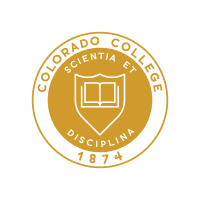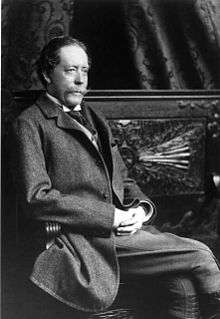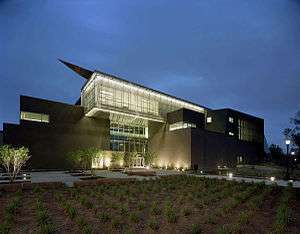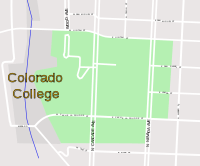Colorado College
 | |
| Motto | Scientia et Disciplina (Latin) |
|---|---|
| Type | Private |
| Established | 1874 |
| Endowment | $680.377 million[1] |
| President | Jill Tiefenthaler |
| Undergraduates | 2,012 |
| Location |
Colorado Springs, Colorado, U.S. 38°50′53″N 104°49′23″W / 38.848°N 104.823°WCoordinates: 38°50′53″N 104°49′23″W / 38.848°N 104.823°W |
| Campus | Urban, 90 Acres |
| Colors |
Black and Gold[2] |
| Athletics |
NCAA Division III Southern Collegiate Athletic Conference (SCAC) Division I Northern Collegiate Hockey Association, men's ice hockey Division I Mountain West Conference, women's soccer |
| Nickname | Tigers |
| Website |
www |
 | |
The Colorado College (also known as CC) is a private liberal arts college in Colorado Springs, Colorado, United States, near the foot of the Rocky Mountains. It was founded in 1874 by Thomas Nelson Haskell.[3] The college enrolls approximately 2,000 undergraduates at its 90-acre (36 ha) campus, 70 miles (110 km) south of Denver. The college offers 42 majors and 33 minors, and has a student-faculty ratio of 10:1.[4] Famous alumni include Ken Salazar, Lynne Cheney, James Heckman and Marc Webb. Colorado College has an acceptance rate of 17%,[5] was ranked as the best private college in Colorado by Forbes,[6] and listed as the 25th-best National Liberal Arts College in the 2016 U.S. News & World Report rankings.[7]
Colorado College is affiliated with the Associated Colleges of the Midwest. Most sports teams are in the NCAA Division III, with the exception of Division I teams in Men's Hockey and Women's Soccer.
History
Colorado College was founded in 1874 on land designated by U.S. Civil War veteran General William Jackson Palmer, the founder of the Denver and Rio Grande Railroad and of Colorado Springs.[8] Founder Thomas Nelson Haskell, described it as a coeducational liberal arts college in the tradition of Oberlin College.[3] Like many U.S. colleges and universities that have endured from the 19th century it now is secular in outlook, though it retains its liberal arts focus.
Cutler Hall, the college's first building was completed in 1880 and the first degrees were conferred in 1882. The Beta-Omega Chapter of The Kappa Sigma Fraternity was chartered in 1904. William F. Slocum, president from 1888 to 1917, oversaw the initial building of the campus, expanded the library and recruited top scholars in a number of fields.[8] In 1930 Shove Chapel was erected by Mr. John Gray, to meet the religious needs of the students (though Colorado College is not religiously affiliated).

Katharine Lee Bates wrote "America the Beautiful" during her summer teaching position at Colorado College in 1893. The tune has become somewhat of a second school anthem for Colorado College and is commonly sung at commencement and baccalaureate.[9]
Academics

The college offers more than 80 majors, minors, and specialized programs including: Southwest studies, feminist and gender studies, Asian studies, biochemistry, environmental science, neuroscience, Latin American studies, Russian and Eurasian studies, and American cultural studies, as well as an across-the-curriculum writing program. In addition to its undergraduate programs, the college offers a Master of Arts in Teaching (MAT) degree. Tutt Library has approximately half a million bound volumes. In 2012, Colorado College yielded a student-to-faculty ratio of 10:1.[10]
Block plan
Colorado College follows a unique "block plan"; in which students study one subject for three and a half week "blocks", which advocates say allows for more lab time, for research and study in the field, more intensive learning experiences and fewer distractions. Blocks are only three weeks long during the summer session, during which there are also graduate blocks of differing lengths. In parallel with the students, professors teach only one block at a time. Classes are generally capped at 25 students (32 for two professors) to encourage a more personalized academic experience.
Rankings and admissions
In its 2016 edition, U.S. News & World Report ties Colorado College with Bates College, Bryn Mawr College, and Kenyon College for 25th-best liberal arts college in the nation.[11] In the 2016 edition, Colorado College was also ranked #1 among the most innovative national liberal arts colleges along with Bard College, Davidson College, and Franklin and Marshall College. The most innovative schools are those "making the most innovative improvements in terms of curriculum, faculty, students, campus life, technology or facilities." Colorado College is considered a "most selective school," by US News.
Kiplinger's Personal Finance places Colorado College at 11th in its 2012 ranking of best value liberal arts colleges in the United States.[12] CC is also a "Hidden Ivy."
In 2010, Colorado College was ranked 21st in Newsweek's list titled "25 Most Desirable Small Schools," which ranks schools based on selectivity, yield rate, retention rate, and quality of facilities and housing.[13]
CC was also ranked 19th on Newsweek's "Most Desirable Urban Schools" list in the same year.[14]
In 2012, Colorado College placed 12th in College Prowler's "Colleges with the Happiest Students."[15]
In 2014, Forbes rated it 51st overall in "America's Top Colleges," which include both national universities and liberal arts colleges. It was rated 2nd overall in Colorado.[16]
For the Class of 2019 (enrolled fall 2015), Colorado College received 8,054 applications and accepted around 1,369 (17.0%).[17] The number enrolling was 568; the yield rate (the percentage of accepted students who enroll) was 42%.[18] For the class of 2018, 27% identified themselves as students of color, 7% as international students, and 7% as first-generation students. 53% of the enrolled class are female, while 47% are male. The average ACT score was 31, and SAT composites of 1380 (out of 1600)and 2070 (out of 2400). More than 80% of enrolled students are from out of state.[19]
The class of 2018 also had notable percentage increases in student rankings. In terms of class rank (for class of 2018), 26% of enrolled freshmen were in the top 1% of their high school classes, 59% ranked in the top 5%, 80% ranked in the top 10%, and 96% ranked in the top quarter of their high school class.[18] Of the 31% of enrolling freshmen who submitted SAT scores, the middle 50% range of scores were 690 for critical reading, 690 for math, and 690 for writing.[18] The middle 50% range of the ACT Composite score was 29–33 for the enrolled freshmen who submitted the score.[18][20]
Campus

Since the mid-1950s, new facilities include three large residence halls, Worner Campus Center, Tutt Library, Olin Hall of Science and the Barnes Science Center, Honnen Ice Rink, Boettcher Health Center, Schlessman Pool, Armstrong Hall of Humanities, Palmer Hall, El Pomar Sports Center, and Packard Hall of Music and Art. Bemis, Cossitt, Cutler, Montgomery, and Palmer Halls are some of the remaining turn-of-the-century structures on the National Register of Historic Places, along with the William I. Spencer Center. Arthur Hall, once home to the son of President Chester A. Arthur, is another campus building on the historic register.[21]
The face of campus changed again at the beginning of the 21st century with construction of the Western Ridge Housing Complex, which offers apartment-style living for upper-division students and completion of the Russell T. Tutt Science Center. The east campus has been expanded, and is now home to the Greek Quad and several small residence halls known as "theme houses."
Other notable buildings include Tutt Library, designed by Skidmore, Owings & Merrill, and Packard Hall, the music building, designed by Edward Larrabee Barnes.
Edith Kinney Gaylord Cornerstone Arts Center
Colorado College's Edith Kinney Gaylord Cornerstone Arts Center, completed in 2008 and located at the intersection of a performing arts corridor in Colorado Springs, was designed to foster creativity and interdisciplinary collaboration. It is home to the college's film, drama and dance departments and contains a large theater, several smaller performance spaces, a screening room, the I.D.E.A Space gallery, and classrooms, among other rooms. The building is also LEED certified. Architect Antoine Predock designed the building with input from professors and students.
Athletics

The school's sports teams are nicknamed Tigers, though in 1994 a student referendum to change the name to the Cutthroats (Trout) narrowly failed. Colorado College competes at the NCAA Division III level in all sports except men's hockey, in which it participates in the NCAA Division I National Collegiate Hockey Conference, and women's soccer, where it competes as an NCAA Division I team in the Mountain West Conference. CC dropped its intercollegiate athletic programs in football,[22] softball, and women's water polo following the 2008–09 academic year. The Tigers won the NCAA Division I championship twice (1950, 1957), were runners up three times (1952, 1955, 1996) and have made the NCAA Tournament eighteen times, including eleven times since 1995.[23] In 1996, 1997, and 2005, CC played in the Frozen Four, finishing second in 1996. Fifty-five CC Tigers have been named All-Americans.[24] Hockey Hall of Fame coach Bob Johnson coached the Tigers from 1963 to 1966.[25] Despite the relatively small size of the school, the hockey team is often ranked quite highly nationally, although it has been over 50 years since the Tigers last won an NCAA title. Their current coach is Mike Haviland, who previously was head coach of the Hershey Bears of the American Hockey League and was an assistant coach for the Chicago Blackhawks of the National Hockey League.
KRCC
Colorado College operates National Public Radio Member Station KRCC-FM. In 1944, KRCC began as a two-room public address system in the basement of Bemis Hall. Professor Woodson "Chief" Tyree, Director of Radio and Drama Department at Colorado College was the founder and inspirational force in the program that one day became KRCC-FM. In 1946, KRCC moved to South Hall (where Packard Hall now stands) on campus where two students, Charles "Bud" Edmonds '51, and Margaret Merle-Smith '51, were instrumental in securing a war surplus FM transmitter. KRCC began over the air broadcasting in April 1951 as the first non-commercial educational FM radio station in the state of Colorado.
Today, KRCC broadcasts through a series of eleven transmitters and translators throughout southern Colorado and a portion of northern New Mexico. KRCC's main transmitter, atop Cheyenne Mountain, broadcasts three separate HD multi-cast channels, including a channel run completely by Colorado College students called the SOCC (Sounds of Colorado College).
Free speech concerns on campus
The civil liberties organization Foundation for Individual Rights in Education has named Colorado College on its Red Alert list for several years over its treatment of two students who distributed a satirical flyer which parodied the college's Feminist and Gender Studies newsletter.[26]
On November 20, 2015, a student was suspended for 21 months for posting, "They matter, they're just not hot" on Yik Yak in regard to Black women after a racially heated exchange in which Black members of the community were told to "Go back to the cotton field" and chanting of "Race War" on the same app.[27]
In a separate case, on November 25, 2015, The Gazette published an article on the web with this headline: "Sources: Colorado College students expelled for posting South Park reference on Yik Yak".[28]
Notable people
Alumni
Colorado College's alumni include a Nobel Prize winner, 14 Rhodes Scholars, 31 Fulbright fellows, and 68 Watson Fellows.[29] CC has also graduated 18 Olympians[29] and 170 professional hockey players, including over 30 current and former NHL players.[30][31]
Selected notable graduates include:
- Abdul Aziz Abdul Ghani, former prime minister of Yemen
- Neal Baer, former executive producer and writer for "ER," former executive producer for "Law & Order: SVU"
- Lynne Cheney, wife of former Vice President Dick Cheney, novelist, conservative scholar, and former talk-show host
- Earl H. "Dutch" Clark, B.A. 1930, first All-American football player from any college or university in Colorado
- Diana DeGette, U.S. House of Representatives, attorney
- William Drea Adams, former President, Colby College and Bucknell University
- Gregg Easterbrook, author
- Joe Ellis, President of the Denver Broncos professional American football team
- Mark Fiore, Pulitzer Prize-winning political cartoonist
- Peggy Fleming, figure skater, 1968 Olympic champion in ladies' singles and a three-time world champion[32]
- Lori Garver, deputy NASA administrator
- Richard Green (telecommunication), chairman of the Space Sciences Institute, previously served as President and CEO of CableLabs
- Jennifer Galt, current United States Ambassador to Mongolia
- Donna Haraway, class of '66, prominent scholar in the field of science and technology studies
- James Heckman, class of '65, winner of 2000 Nobel Prize for Economics
- William J. Hybl, former president of the U.S. Olympic Committee, delegate to the United Nations General Assembly[33]
- David Jenkins (figure skater), 1960 Olympic gold medalist in men's figure skating, three-time world champion (1957–1959)[34]
- Daniel Junge, Academy Award winning documentary filmmaker, ("Saving Face")
- Jane Lubchenco, marine ecologist and environmental scientist, former head of NOAA
- David Malpass, chief economist at Bear Stearns, Republican candidate for U.S. Senate in New York, founder and president of Encima Global LLC
- Marcia McNutt, geophysicist, former director of U.S. Geological Survey, science advisor to U.S. secretary of the interior[35]
- Tara Nott, first American gold medalist in women's weight lifting, 2000 Olympics[36]
- Doug Pray, Emmy Award-winning film director ("Art & Copy")
- Gregor Robertson, mayor of Vancouver, British Columbia, Canada
- Carol Rymer Davis, balloonist
- Steve "sudden death" Sabol, President, NFL Films
- Ken Salazar, United States Secretary of the Interior, former United States senator
- Ed Smith, former NFL player for the Denver Broncos[37]
- Mark Stuart, NHL player, alternate captain Winnipeg Jets
- Abigail Washburn, banjo player and songwriter
- Marc Webb, music video, short film and motion picture director ("(500) Days of Summer," "The Amazing Spider-Man")
- Terry Winograd, co-director of the Stanford Human-Computer Interaction Group
- Dean Winters, actor (Rescue Me, Battle Creek, Oz, Law and Order: SVU)
Faculty
A significant number of Colorado College faculty are widely published and renowned in their fields. Professor Dennis Showalter, the 2005 recipient of the Samuel Eliot Morison Prize for Lifetime Achievement in Military History, is an expert on World War II, a Distinguished Visiting Professor at West Point and the United States Air Force Academy, reviewer for the History Book Club, and author of Tannenberg: Clash of Empires, the 1992 winner of the American Historical Association's Paul Birdsall Prize. In 2005, he published Men of War, the first single volume dual military biography of Patton and Rommel. Other widely published professors in the Political Science department include Thomas Cronin and Andrew Price-Smith.
Notable faculty members include:
- Dan Johnson, microeconomist and entrepreneur, notable for research in predicting Olympic medals.[38]
- Anne F. Hyde, historian, author, 2012 Bancroft Prize winner,[39] 2012 Pulitzer Prize finalist[40]
- Jim Parco, author, businessman, and retired Air Force Lieutenant Colonel
- David Mason, Poet Laureate of Colorado
- Ofer Ben-Amots, Israeli-American classical composer
- Peter Blasenhiem, Latin American & African historian, as well as Brazlianist[41][42]
- Edward Diller, German literary scholar and author
References
- ↑ As of June 30, 2014. "Endowment".
- ↑ "Visual Identity Resources". coloradocollege.edu.
- 1 2 Loevy, R. 11 Myths About Colorado College. Retrieved on: 2010-05-19.
- ↑ "Departments and Program". Colorado College.
- ↑ Emilia, Whitmer. "Admissions office has another record breaking year". The Catalyst.
- ↑ "America's Top Colleges: Colorado". Forbes.
- ↑ "Colorado College". U.S. News and World Report.
- 1 2 Colorado College. History of Colorado College. Retrieved on: 2010-05-19.
- ↑ America the Beautiful
- ↑ "Colorado College". locatecolleges.com.
- ↑ "National Liberal Arts College Rankings-2012". U.S. News & World Report.
- ↑ "Best Values in Private Colleges". Kiplinger's Personal Finance. Retrieved December 1, 2012.
- ↑ "25 Most Desirable Small Schools".
- ↑ "Most Desirable Urban Schools".
- ↑ "Colleges with the Happiest Students".
- ↑ Ryan Craig. "Colorado College". Forbes.
- ↑ Whitmer, Emilia. "Admissions office has another record breaking year". The Catalyst.
- 1 2 3 4 "Colorado College Common Data Set 2012–2013, Part C". Colorado College.
- ↑ "Class of 2018". coloradocollege.edu.
- ↑ "You're More Than a Test Score • Colorado College". coloradocollege.edu.
- ↑ El Paso County – Colorado State Register of Historic Properties. History Colorado. June 8, 2013.
- ↑ Arey, Charles. "Discontinued Smaller College Teams". http://www.nationalchamps.net. Retrieved 26 January 2015. External link in
|website=(help) - ↑ Colorado College | Ice Hockey History NCAA Tournament Archived September 22, 2006 at the Wayback Machine
- ↑ Colorado College | Ice Hockey History All-Americans Archived February 11, 2007 at the Wayback Machine
- ↑ Colorado College | Ice Hockey History Coaches Archived September 22, 2006 at the Wayback Machine
- ↑ Colorado College: Students Found Guilty for Satirical Flyer, FIRE.org, March 31, 2008.
- ↑ https://www.thefire.org/colorado-college-suspends-student-for-two-years-for-six-word-joke-on-yik-yak/
- ↑ http://gazette.com/sources-two-colorado-college-students-expelled-for-posting-south-park-reference-on-yik-yak/article/1564265
- 1 2 "After CC". Colorado College.
- ↑ "Alumni Report". Internet Hockey Database. 2011. Retrieved May 11, 2011.
- ↑ "Tiger Hockey Media Guide 2013–2014" (PDF). Retrieved November 30, 2013.
- ↑ "Famous Alumni of Colorado College - Celebrities Who Graduated/Went to Colorado College". Ranker.
- ↑ "William J. Hybl". United States Department of State.
- ↑ "David Jenkins". http://www.sports-reference.com/olympics/athletes/je/david-jenkins-2.html. External link in
|website=(help); - ↑ , editor in chief of Science"California: Leader for Geological Survey". The New York Times. 2009-10-27.
- ↑ "After CC • Colorado College". Colorado College. Retrieved 2012-02-29.
- ↑ http://www.nfl.com/player/edsmith/2525939/profile
- ↑ William Heuslein (19 January 2010). "The Man Who Predicts The Medals". Forbes.
- ↑ "Winners of the 2012 Bancroft Prize Announced". Retrieved 2012-12-10.
- ↑ "2012 Finalists". Retrieved 2012-12-10.
- ↑ "Profile • History • Colorado College". Colorado College. Retrieved 2012-02-29.
- ↑ "Peter Blasenheim". Colorado College. Retrieved 2012-02-29.
Further reading
- Dunn, Joe P., "A Mission on the Frontier: Edward P. Tenney, Colorado College, the New West Education Commission, and the School Movement for Mormons and ‘Mexicans,’" History of Education Quarterly, 52 (Nov. 2012), 535–58.
- Loevy, Robert D. Colorado College: A Place of Learning, 1874–1999. Colorado Springs: Colorado College, 1999.
- Reid, J. Juan. Colorado College: The First Century, 1874–1974. Colorado Springs: Colorado College, 1979.
External links
| Wikisource has the text of the 1921 Collier's Encyclopedia article Colorado College. |